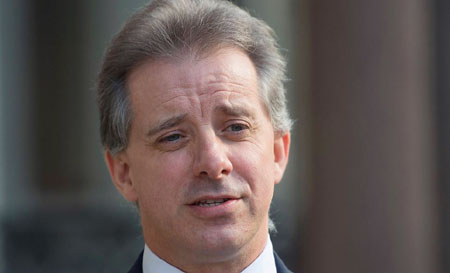⁹by WorldTribune Staff, March 17, 2019
Christopher Steele admitted under oath that he used information from a user-generated CNN website for his anti-Trump dossier which has been treated by U.S. media and the FBI as intelligence.
Steele made the revelation during testimony last year in a case where Russian entrepreneur Aleksej Gubarev, a prominent figure in the dossier, had sued BuzzFeed for libel, Fox News reported. BuzzFeed was the first news outlet to publish Steele’s unverified dossier in full.

According to a newly released transcript of the deposition, Steele was asked how he verified allegations about Gubarev’s companies Webzilla and XBT Holdings and whether he found “anything of relevance concerning Webzilla.”
“We did. It was an article I have got here which was posted on July 28, 2009, on something called CNN iReport,” Steele testified.
CNN iReport states that it is a “user-generated site” and warns that “the stories submitted by users are not edited, fact-checked or screened before they post.” Though archives of CNN iReport remain accessible online, the site appears to be no longer active.
Asked if he understood how the CNN website actually worked, Steele testified: “I do not have any particular knowledge of that” and noted he didn’t understand at the time that the site has “no connection to any CNN reporters.”
“Do you understand that CNN iReports are or were nothing more than any random individuals’ assertions on the Internet?” an examiner asked Steele.
He replied: “No, I obviously presume that if it is on a CNN site that it may has [sic] some kind of CNN status. Albeit that it may be an independent person posting on the site.”
CNN iReport specifically notes that none of the users who submit content can be described as working for CNN.
“Being an iReport.com user and creating and uploading content to iReport.com does not mean that you work for CNN, and you should never represent yourself as working for CNN,” the site’s FAQ section read.
In the dossier, Steele alleged that Gubarev’s companies “used botnets and porn traffic to transmit viruses, plant bugs, steal data and conduct ‘alerting operations’ against the Democratic Party leadership” and that Gubarev himself played a “significant” part in the operation while “under duress” from the Russian security agency FSB.
Despite more than two years of effort by the corporate media, none of the allegations made by Steele in the dossier have been verified. Yahoo News pundit Michael Isikoff, one of the first to break the story in 2016, has admitted Steele’s allegations are “likely false.” Former FBI Director James Comey has testified that the FBI had been unable to verify any of the allegations. Steele has previously testified under oath to British authorities that he was unable to verify any of the dossier’s claims.
“The latest revelation of using unconfirmed sources put the dossier’s legitimacy further into question, especially since the FBI extensively relied on the dossier in its warrant applications to the Foreign Intelligence Surveillance Act (FISA) court in seeking to surveil Trump aide Carter Page,” Fox News noted.
Breitbart senior editor-at-large Joel B. Pollak noted that “CNN is known to have known about the contents of the dossier; then-FBI director James Comey warned President-elect Trump that CNN had the document and were looking for a ‘news hook.’ Once Buzzfeed published it, CNN was quick to report on the dossier, and has continued to treat it as legitimate ever since in its effort to substantiate claims of Russian ‘collusion’ with Trump, though the dossier’s main contentions have never been corroborated.
Ironically, at least some of the dossier’s content may have originated with CNN itself.
Check Out Geostrategy-Direct __________ Jump Start the U.S. Media
